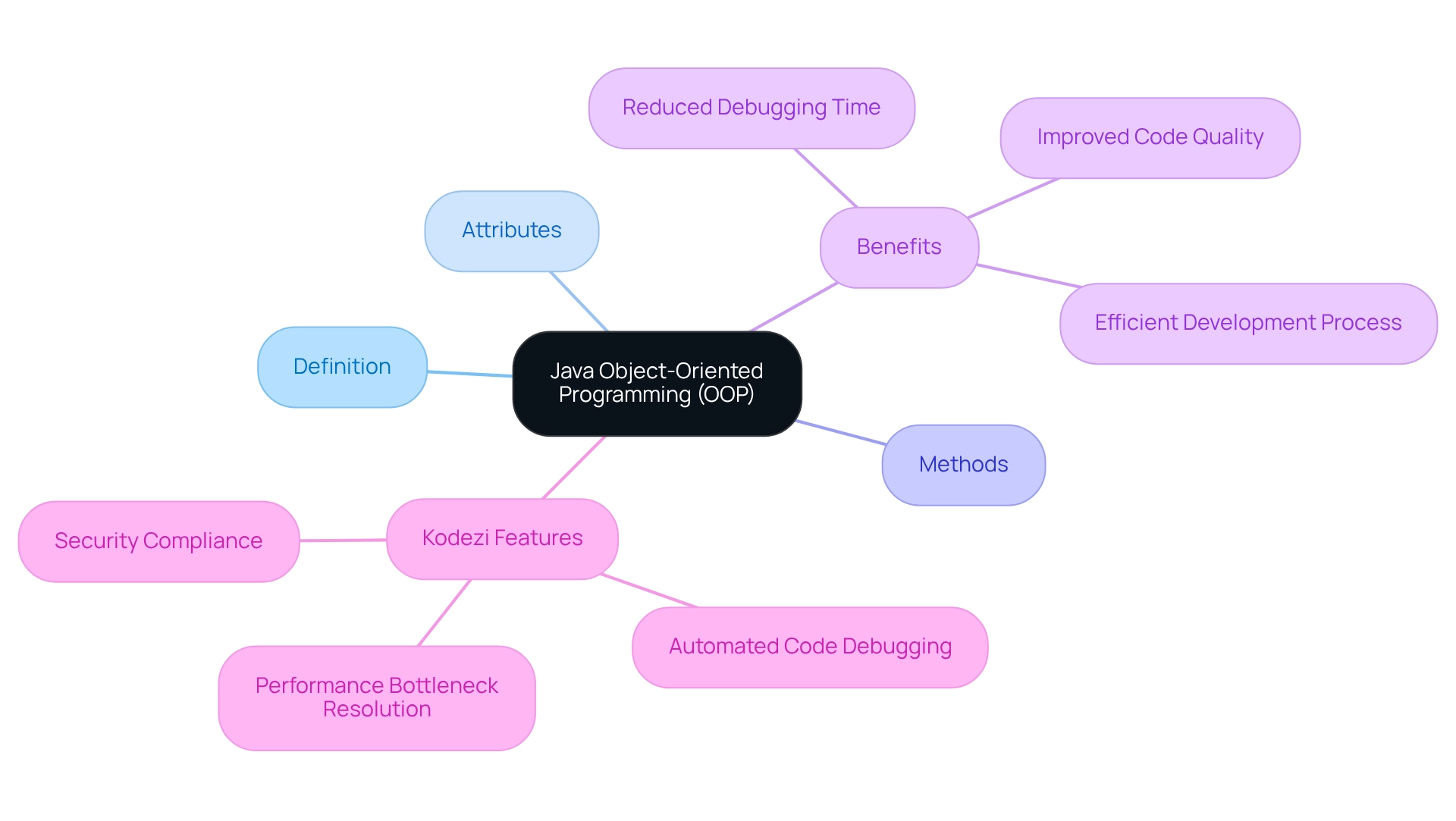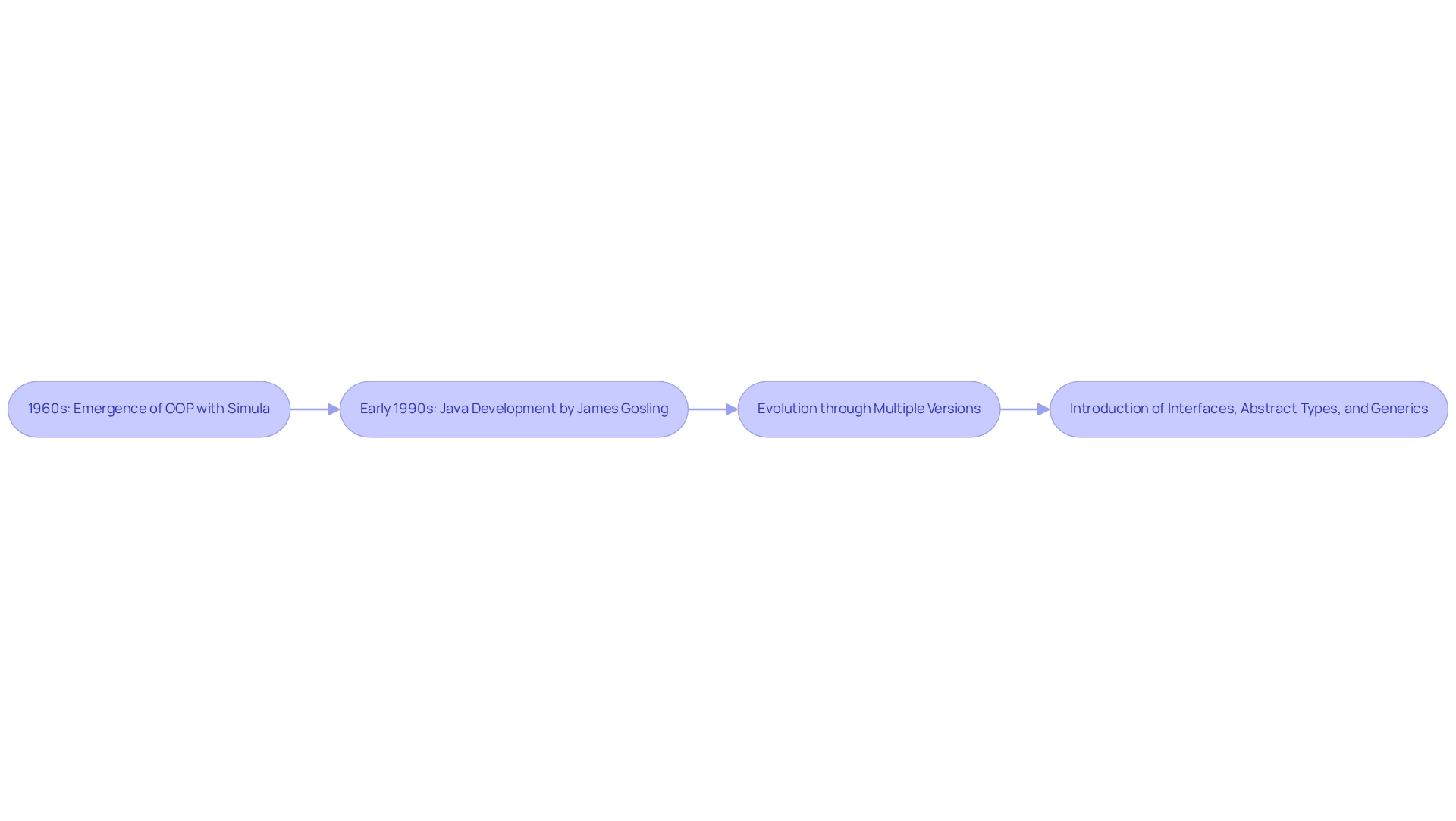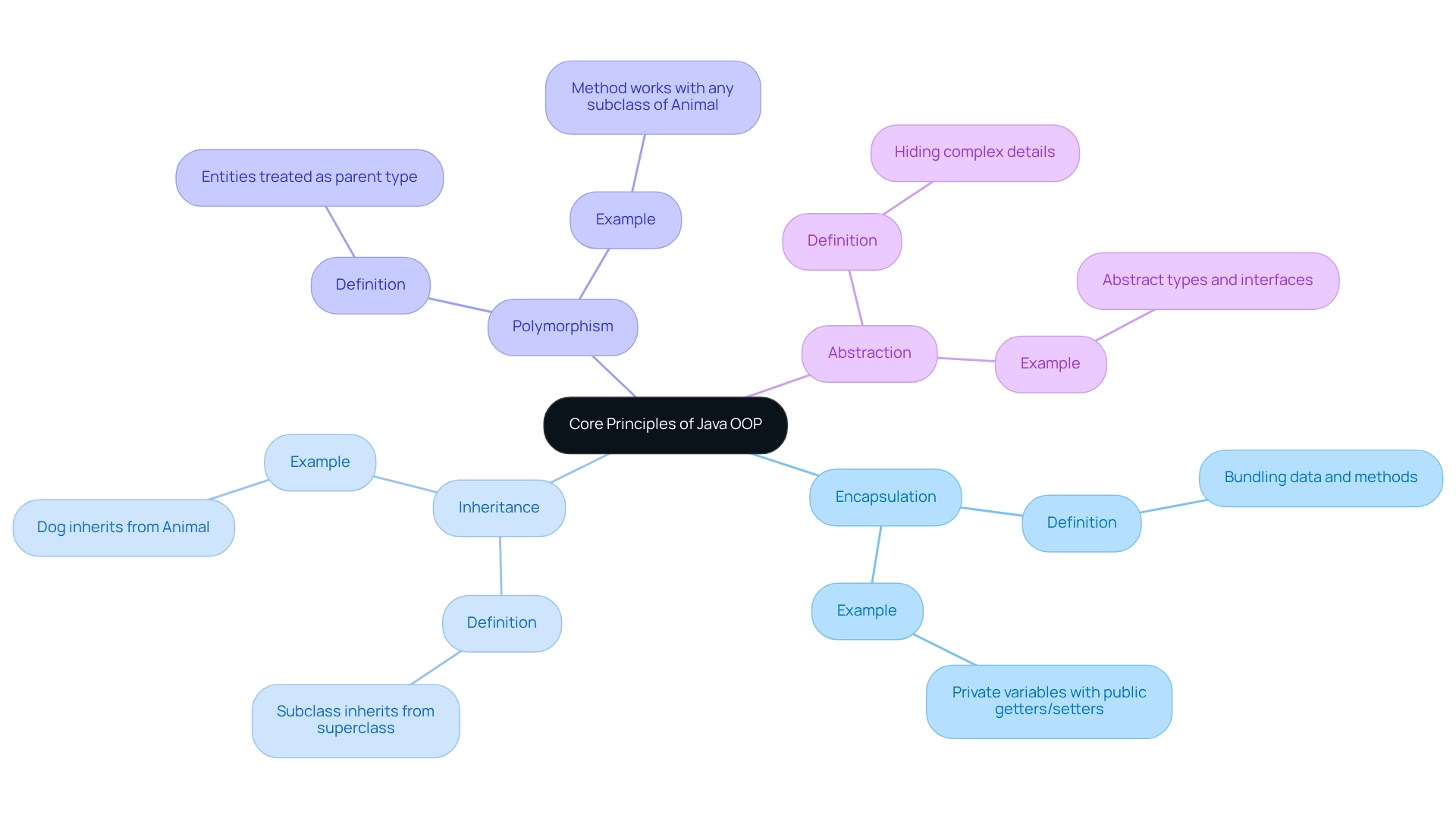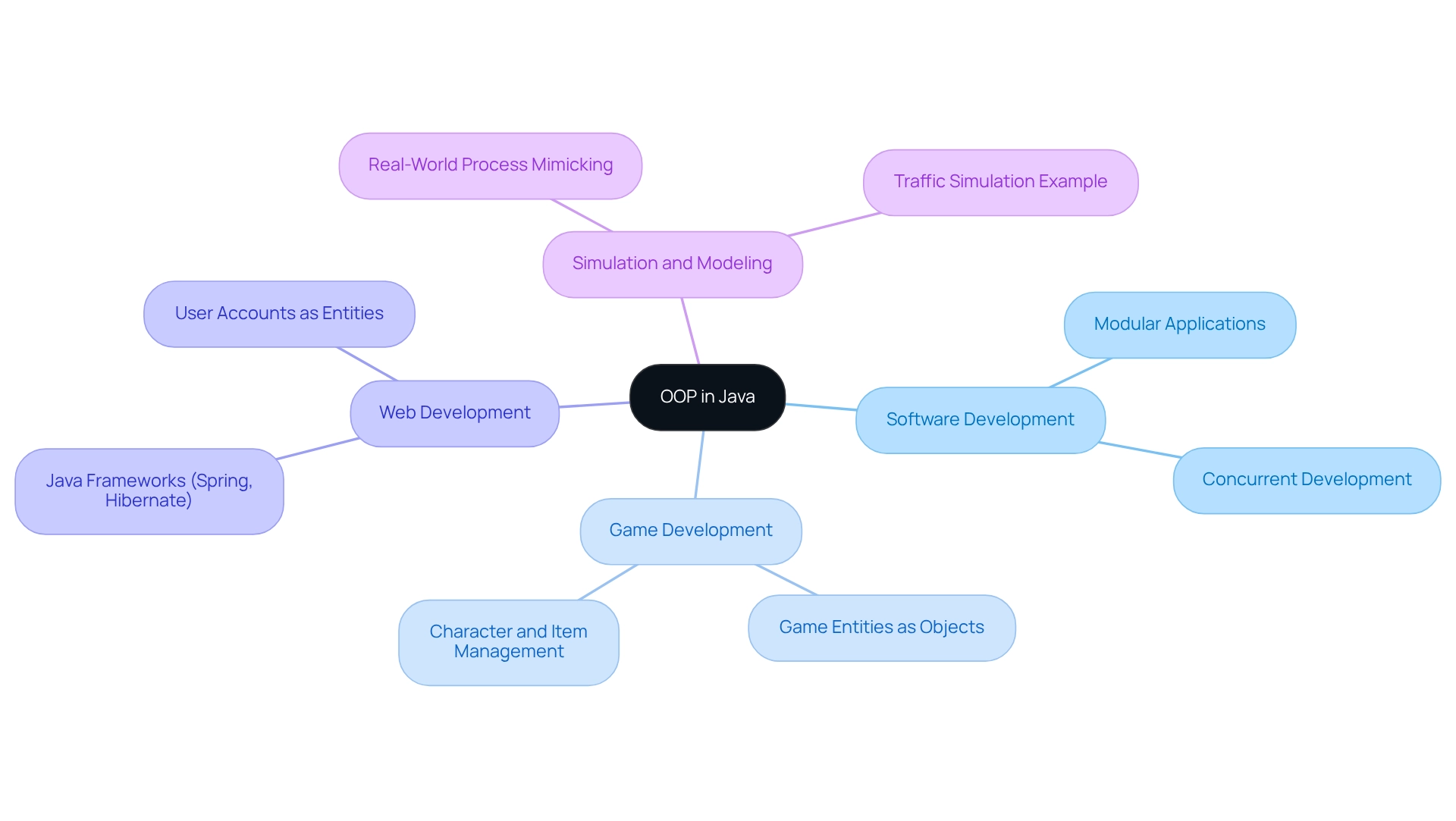Overview
In the world of software development, coding challenges are a common hurdle that many developers face. How can one effectively manage the complexities of programming while ensuring high-quality code?
Java Object-Oriented Programming (OOP) offers a solution by structuring software design around data entities, promoting modular and reusable code that mirrors real-world scenarios. Kodezi addresses these challenges with its innovative features that enhance coding efficiency.
The core principles of Java OOP—encapsulation, inheritance, polymorphism, and abstraction—are essential for improving productivity. By leveraging these principles, Kodezi enables developers to manage complex applications with ease, ultimately leading to better code quality. Imagine being able to streamline your coding practices and reduce the time spent on debugging.
Furthermore, using Kodezi can significantly enhance your development experience. The platform not only simplifies the coding process but also provides tools that help you maintain high standards in your work. Are you ready to elevate your coding practices? Explore the tools available on Kodezi and discover how they can transform your approach to programming.
Introduction
In the realm of software development, coding challenges often hinder developers' efficiency and creativity. How can these obstacles be overcome? Enter Java Object-Oriented Programming (OOP), a powerful paradigm that reshapes how applications are designed and built. By focusing on the creation of objects—entities that encapsulate both data and behaviors—Java allows developers to construct modular and reusable code that mirrors real-world interactions. Furthermore, tools like Kodezi address these challenges by automating debugging and performance optimization, enabling developers to focus on what truly matters: crafting high-quality applications.
As we delve into the essence of Java OOP, we trace its evolution, examine its core principles, and illustrate its practical applications across various domains. From enhancing code organization through encapsulation to enabling complex interactions in game development, Java OOP not only streamlines the programming process but also boosts productivity. Imagine being able to enhance your coding practices with tools that simplify complex tasks. Kodezi exemplifies this by offering features that improve productivity and code quality, making it essential for developers aiming to create robust and scalable applications.
As the digital landscape continues to evolve, understanding and leveraging Java OOP becomes crucial. Are you ready to explore the tools available on the Kodezi platform? Embrace the future of software development with Java OOP and Kodezi, and unlock your potential as a developer.
Define Java Object-Oriented Programming (OOP)
Coding challenges can be daunting for developers, especially when it comes to managing complex software designs. What is Java OOP offers a solution by structuring software design around data, or entities, instead of functions and logic. In OOP, what is Java OOP involves entities that are instances of types serving as blueprints, defining both the properties (attributes) and behaviors (methods) of the entities. This paradigm enables developers to create modular, reusable code that reflects real-world scenarios, which is crucial for understanding what is Java OOP, simplifying the management and scaling of applications.
Furthermore, integrating tools like Kodezi can address these challenges effectively. Kodezi enhances the OOP process with features such as automated code debugging, performance bottleneck resolution, and security compliance. Its AI-powered capabilities facilitate automatic code correction and bug analysis, leading to significant productivity boosts across various programming languages and IDEs.
Imagine the benefits of using Kodezi:
- Improved code quality
- Reduced debugging time
- A more efficient development process
By leveraging these tools, developers can focus on what truly matters—creating innovative solutions without the constant worry of code errors.
In addition, Kodezi’s user-friendly interface makes it accessible, allowing developers of all levels to harness its power. Are you ready to explore the tools available on the platform and elevate your coding experience?

Trace the Evolution of OOP in Java
The concept of Object-Oriented Programming (OOP) emerged in the 1960s with the development of the Simula language, which introduced the foundational ideas of objects and classes. This programming paradigm gained significant traction with the creation of a prominent language, which exemplifies what is Java OOP, by James Gosling and his team at Sun Microsystems in the early 1990s. As an object-oriented language, what is Java OOP aimed to provide a robust platform for building applications effectively. Over the years, this language has evolved through multiple versions, incorporating various OOP principles, which exemplifies what is Java OOP to enhance its capabilities. Furthermore, the introduction of features such as interfaces, abstract types, and generics has further solidified its position in what is Java OOP, enabling developers to construct intricate and scalable applications with greater efficiency.

Examine the Core Principles of Java OOP
For any developer facing coding challenges, understanding what is Java OOP and its core principles is crucial. These principles not only provide a foundation for effective coding practices but also enhance productivity and code quality.
-
Encapsulation is one of the key principles, which involves bundling the data (attributes) and methods (functions) that operate on the data into a single unit, or class. This limits direct access to certain components of the entity, helping to avoid unintended interference and misuse of the data. For instance, by using private variables along with public getter and setter methods, developers can control access to an object's state.
-
Inheritance allows a new type (subclass) to inherit attributes and behaviors from an existing type (superclass). This principle encourages code reusability and establishes a hierarchical relationship between types. For example, a
Dogtype can inherit from anAnimaltype, acquiring its attributes and methods while also incorporating its own distinct features. -
Polymorphism enables entities to be treated as instances of their parent type, facilitating method overriding and dynamic method resolution. This means a single function can operate on different types of objects, enhancing flexibility. For instance, a method that accepts an
Animaltype can seamlessly work with any subclass ofAnimal, such asDogorCat. -
Finally, Abstraction focuses on hiding complex implementation details and exposing only the necessary parts. In programming, this can be achieved through abstract types and interfaces, which specify methods that subclasses need to implement without providing the actual implementation. This approach simplifies interaction with complex systems by offering a clear interface. By mastering these principles of what is Java OOP, developers can significantly improve their coding efficiency and quality.

Illustrate Practical Applications of OOP in Java
Coding challenges are prevalent in software development, and knowing what is java oop provides effective solutions across various domains.
Software Development: OOP facilitates the creation of modular applications, simplifying code management and updates. For instance, in enterprise applications, different modules can be developed as separate classes, allowing teams to work concurrently without conflicts.
Game Development: In game creation, OOP is utilized to represent game entities such as characters, items, and environments as distinct objects. Each item can possess its own characteristics and actions, facilitating the management of intricate interactions within the game universe.
Web Development: Java frameworks like Spring and Hibernate leverage OOP principles to create scalable web applications. In a web application, user accounts can be depicted as entities, encapsulating user information and actions, which simplifies data management and enhances security.
Simulation and Modeling: OOP is ideal for creating simulations that mimic real-world processes. For example, in a traffic simulation, vehicles can be modeled as objects with properties like speed and direction, allowing for realistic interactions and behaviors.
By utilizing OOP principles, developers can create more efficient, maintainable, and scalable applications, which is essential for understanding what is java oop. This ultimately leads to improved productivity and code quality. Are you ready to explore how these principles can transform your coding practices?

Conclusion
In the realm of software development, developers encounter numerous coding challenges that can hinder their productivity and efficiency. Java Object-Oriented Programming (OOP) offers a transformative approach to address these complexities, emphasizing the organization of code around objects. This not only enhances modularity and reusability but also reflects real-world interactions, simplifying application design and management.
Furthermore, the core principles of encapsulation, inheritance, polymorphism, and abstraction lay the groundwork for robust software creation. These principles empower developers to build scalable solutions that adapt to evolving requirements. The evolution of Java OOP, marked by continuous enhancements, has enabled developers to leverage advanced features that significantly improve code efficiency and maintainability.
In addition, innovative tools like Kodezi automate debugging and performance optimization, allowing developers to focus on crafting high-quality applications without the burden of routine challenges. The benefits of Java OOP are evident across various domains, including enterprise software, game development, web applications, and simulations. By employing OOP principles, developers can create systems that are efficient and maintainable, capable of handling complex interactions seamlessly.
As the digital landscape evolves, embracing Java OOP and tools like Kodezi becomes essential for developers seeking to unlock their full potential and drive innovation. The future of software development transcends mere coding; it encompasses the creation of intelligent, adaptable systems that empower developers and elevate user experiences. Are you ready to explore the tools available on the Kodezi platform and enhance your coding practices?
Frequently Asked Questions
What is Java OOP and how does it help developers?
Java OOP (Object-Oriented Programming) helps developers manage complex software designs by structuring software around data (entities) rather than functions and logic. It allows for the creation of modular, reusable code that reflects real-world scenarios, simplifying the management and scaling of applications.
What are the main components of entities in Java OOP?
In Java OOP, entities are instances of types that serve as blueprints, defining both the properties (attributes) and behaviors (methods) of the entities.
How does Kodezi enhance the OOP process?
Kodezi enhances the OOP process by providing features such as automated code debugging, performance bottleneck resolution, and security compliance. Its AI-powered capabilities facilitate automatic code correction and bug analysis.
What benefits can developers expect from using Kodezi?
Developers can expect improved code quality, reduced debugging time, and a more efficient development process by using Kodezi.
Who can use Kodezi and how accessible is it?
Kodezi is designed to be user-friendly and accessible, allowing developers of all levels to harness its power for enhancing their coding experience.




